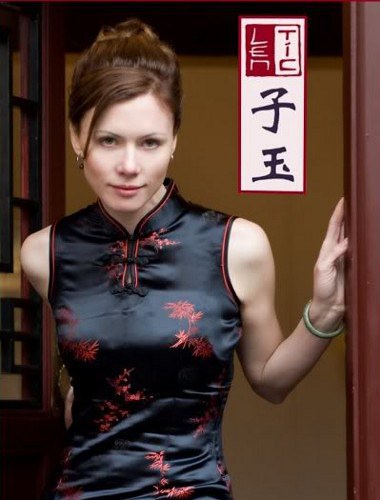They used to say, 'Go to China, you'll be a star!'
- By Ember Swift
 0 Comment(s)
0 Comment(s) Print
Print E-mail China.org.cn, March 5, 2014
E-mail China.org.cn, March 5, 2014
|
|
| Ember Swift is a Canadian musician and her Chinese name is 子玉 (Zi Yu). |
It offended me. What "they" meant (my family, friends and fans) was that my study of Chinese in university would somehow propel me to stardom as a musician-my main vocation then-rather than remaining in English-speaking countries, namely my homeland of Canada.
I know they meant my blond hair and green eyes would stand out as soon as I stepped on stage in Asia, my white skin and fair features translating into success for my musical future. I had musical dreams, to be certain, but there was (and is) nothing in me that would desire success by those means. I sought career achievement through talent and hard work, not racial profiling. What's more, my academic study of the culture was rooted in a profound respect for China's ancient heritage. In short, I loved China; I had no interest in using her.
Almost a decade later, I finally did come to China, but specifically as a personal sabbatical from my hectic music career. I never intended to return three times, fall in love, and eventually move here permanently to restart my life. By then, I had more than proven I could achieve success as a professional musician; my musical dreams had already come true. I discovered that China offered me the realization of other, dormant dreams, like motherhood and Mandarin fluency. They awakened when my foot touched down on this reverberant soil.
Nevertheless, I have continued to pursue my music career here, albeit somewhat reluctantly despite all earlier misgivings. What I have learned about this Chinese music industry, first and foremost, is that they were wrong. And, for the record, so was I. I had no need to be offended by that?comment from years past because it simply wasn't rooted in reality.
|
|
| Ember Swift is a Canadian musician and her Chinese name is 子玉 (Zi Yu). |
Foreign artists are not catapulted to center stage here as though our ethnicity gains us focus. In fact, it is exactly the opposite; we will always be on the periphery of the contemporary music business, securing gigs sometimes precisely because we are the token or novelty non-Chinese performers the programmers require. What's more, my "otherness," will only ever be tolerated rather than absorbed into a national identity. This is definitely not a melting pot. I am and will forever be a "waiguoren"-literally a person from a country on the outside, or an outsider-with or without a music career, with or without a mixed racial family and a long-term history here. Good thing using my foreignness to achieve success was never my goal!
I have released two album projects since being in China, making my career releases (to date) total 11 audio and 2 video productions. My two most recent albums have included Chinese lyrics, partially geared to a Chinese audience. Interestingly enough, my choice to include Chinese lyrics in my work (in order to respectfully communicate in the "language of the land") has not always been advantageous in this geographic market. Often gigs will request only English songs! If there's anything I've learned about China, it's to never presume what lies ahead. As my friend once said so succinctly, "If we wanted somewhere that made sense, we would never have chosen China."
If China wants to attract more professional musical artists and songwriters to the country, Chinese society would require a complete restructuring of values around culture, race and ethnicity. This is most certainly not a multicultural environment. As it stands, when representing Beijing, professional foreigners like me (long-term expats who consider this our home) are rarely invited to attend music trade shows, showcase events, or local festivals. In short, our professional activity or progress aside, we aren't considered musical representatives of this city or country.
I have no illusions about stardom in China; I've only ever come here for personal growth and have been more than compensated in that department. I've learned a language that I adore, I've found love with a fellow Chinese musician, and I've become a mother to two gorgeous children whom I will watch grow up straddling both of their cultural heritages: Canada's and China's. I feel truly blessed. What's more, my China dreams have now expanded outwards to include the dream for securing clean air, safe food choices, and effective education options for my family. I continue to have faith in this country to deliver.
Today, I would have a different response to: "Move to China! You'll become a star!"
It's this: "First, I aim to understand China, listen to her cultural lessons, and maybe find a small space to make a life for myself here. The music will follow. In my life, it always does."
And, so it has.
The author is a columnist with China.org.cn. For more information please visit:
http://m.91dzs.com/opinion/emberswift.htm







